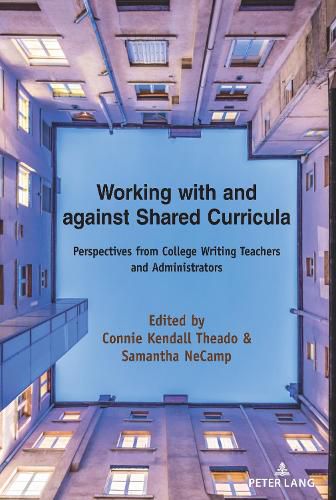Readings Newsletter
Become a Readings Member to make your shopping experience even easier.
Sign in or sign up for free!
You’re not far away from qualifying for FREE standard shipping within Australia
You’ve qualified for FREE standard shipping within Australia
The cart is loading…






This title is printed to order. This book may have been self-published. If so, we cannot guarantee the quality of the content. In the main most books will have gone through the editing process however some may not. We therefore suggest that you be aware of this before ordering this book. If in doubt check either the author or publisher’s details as we are unable to accept any returns unless they are faulty. Please contact us if you have any questions.
Working with and against Shared Curricula: Perspectives from College Writing Teachers and Administrators explores the complexities surrounding the expanding use of shared curricula-syllabi and assignments intended to work universally, for all teachers and all students within a given writing program. Chapters in this collection offer the experiential accounts and research-based arguments needed to prepare teachers and administrators to respond to calls to scale up writing programs for delivery by contingent instructors, in online courses, or at distant sites. Speaking from a variety of perspectives and institutional locations, these authors grapple with questions increasingly common in writing programs: In what ways do shared curricula forward noble goals, such as reducing workload for teachers or ensuring an equitable educational experience for all?; In what ways do shared curricula undermine teacher efficacy and student learning?; When syllabi and assignments are exported from one location to another, what contexts are gained, lost, or changed in the process? In the end, what emerges from this collection is not a clear or simplified argument either for or against shared curricula and pre-designed courses. Instead, readers gain a nuanced picture of both the affordances and limitations of these instructional models for writing programs, and their potential impacts for teachers and students. By exploring the lived experiences, material conditions, political economies, and ideological conflicts of shared curricula environments for multiple stakeholders, this collection serves as a thoughtful interrogation of scalability in writing instruction.
$9.00 standard shipping within Australia
FREE standard shipping within Australia for orders over $100.00
Express & International shipping calculated at checkout
This title is printed to order. This book may have been self-published. If so, we cannot guarantee the quality of the content. In the main most books will have gone through the editing process however some may not. We therefore suggest that you be aware of this before ordering this book. If in doubt check either the author or publisher’s details as we are unable to accept any returns unless they are faulty. Please contact us if you have any questions.
Working with and against Shared Curricula: Perspectives from College Writing Teachers and Administrators explores the complexities surrounding the expanding use of shared curricula-syllabi and assignments intended to work universally, for all teachers and all students within a given writing program. Chapters in this collection offer the experiential accounts and research-based arguments needed to prepare teachers and administrators to respond to calls to scale up writing programs for delivery by contingent instructors, in online courses, or at distant sites. Speaking from a variety of perspectives and institutional locations, these authors grapple with questions increasingly common in writing programs: In what ways do shared curricula forward noble goals, such as reducing workload for teachers or ensuring an equitable educational experience for all?; In what ways do shared curricula undermine teacher efficacy and student learning?; When syllabi and assignments are exported from one location to another, what contexts are gained, lost, or changed in the process? In the end, what emerges from this collection is not a clear or simplified argument either for or against shared curricula and pre-designed courses. Instead, readers gain a nuanced picture of both the affordances and limitations of these instructional models for writing programs, and their potential impacts for teachers and students. By exploring the lived experiences, material conditions, political economies, and ideological conflicts of shared curricula environments for multiple stakeholders, this collection serves as a thoughtful interrogation of scalability in writing instruction.